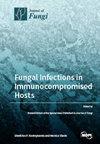Exploring Endophytic Fungi as Natural Antagonists against Fungal Pathogens of Food Crops
IF 4.2
2区 生物学
Q2 MICROBIOLOGY
引用次数: 0
Abstract
The yield and quality of cultivated food crops are frequently compromised by the prevalent threat from fungal pathogens that can cause widespread damage in both the pre-harvest and post-harvest stages. This paper investigates the challenges posed by fungal pathogens to the sustainability and yield of essential food crops, leading to significant economic and food security repercussions. The paper critiques the long-standing reliance on synthetic fungicides, emphasizing the environmental and health concerns arising from their widespread and occasionally inappropriate use. In response, the paper explores the potential of biological control agents, specifically endophytic fungi in advancing sustainable agricultural practices. Through their diverse symbiotic relationships with host plants, these fungi exhibit strong antagonistic capabilities against phytopathogenic fungi by producing various bioactive compounds and promoting plant growth. The review elaborates on the direct and indirect mechanisms of endophytic antagonism, such as antibiosis, mycoparasitism, induction of host resistance, and competition for resources, which collectively contribute to inhibiting pathogenic fungal growth. This paper consolidates the crucial role of endophytic fungi, i.e., Acremonium, Alternaria, Arthrinium, Aspergillus, Botryosphaeria, Chaetomium, Cladosporium, Cevidencealdinia, Epicoccum, Fusarium, Gliocladium, Muscodor, Nigrospora, Paecilomyces, Penicillium, Phomopsis, Pichia, Pochonia, Pythium, Ramichloridium, Rosellinia, Talaromyces, Trichoderma, Verticillium, Wickerhamomyces, and Xylaria, in biological control, supported by the evidence drawn from more than 200 research publications. The paper pays particular attention to Muscodor, Penicillium, and Trichoderma as prominent antagonists. It also emphasizes the need for future genetic-level research to enhance the application of endophytes in biocontrol strategies aiming to highlight the importance of endophytic fungi in facilitating the transition towards more sustainable and environmentally friendly agricultural systems.探索内生真菌作为粮食作物真菌病原体的天然拮抗剂
真菌病原体在收获前和收获后阶段都会造成大面积损害,其普遍存在的威胁经常会损害栽培粮食作物的产量和质量。本文研究了真菌病原体对基本粮食作物的可持续性和产量构成的挑战,这将对经济和粮食安全产生重大影响。本文对长期以来对合成杀菌剂的依赖进行了批判,强调了由于合成杀菌剂的广泛使用(有时使用不当)而引起的环境和健康问题。为此,论文探讨了生物控制剂,特别是内生真菌在推进可持续农业实践方面的潜力。这些真菌通过与寄主植物的多种共生关系,产生各种生物活性化合物并促进植物生长,从而对植物病原真菌表现出强大的拮抗能力。这篇综述阐述了内生真菌拮抗作用的直接和间接机制,如抗生、寄生、诱导宿主抗性和资源竞争,这些机制共同有助于抑制病原真菌的生长。本文阐述了内生真菌的关键作用、Acremonium, Alternaria, Arthrinium, Aspergillus, Botryosphaeria, Chaetomium, Cladosporium, Cevidencealdinia, Epicoccum, Fusarium, Gliocladium, Muscodor, Nigrospora, Paecilomyces, Penicillium, Phomopsis, Pichia、在生物防治方面,Pochonia、Pythium、Ramichloridium、Rosellinia、Talaromyces、Trichoderma、Verticillium、Wickerhamomyces 和 Xylaria 的作用得到了 200 多篇研究论文的支持。本文特别关注了麝香草菌、青霉和毛霉这些突出的拮抗剂。论文还强调了未来基因层面研究的必要性,以加强内生真菌在生物防治战略中的应用,从而突出内生真菌在促进向更可持续和环境友好型农业系统过渡方面的重要性。
本文章由计算机程序翻译,如有差异,请以英文原文为准。
求助全文
约1分钟内获得全文
求助全文
来源期刊

Journal of Fungi
Medicine-Microbiology (medical)
CiteScore
6.70
自引率
14.90%
发文量
1151
审稿时长
11 weeks
期刊介绍:
Journal of Fungi (ISSN 2309-608X) is an international, peer-reviewed scientific open access journal that provides an advanced forum for studies related to pathogenic fungi, fungal biology, and all other aspects of fungal research. The journal publishes reviews, regular research papers, and communications in quarterly issues. Our aim is to encourage scientists to publish their experimental and theoretical results in as much detail as possible. Therefore, there is no restriction on paper length. Full experimental details must be provided so that the results can be reproduced.
 求助内容:
求助内容: 应助结果提醒方式:
应助结果提醒方式:


